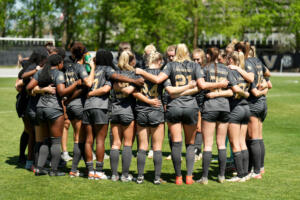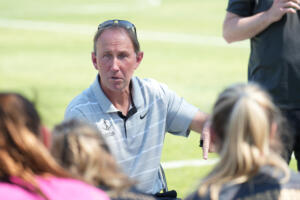New Mentor in Town
by Graham HaysSoccer associate head coach Casey Derkacz looks to pay forward the lessons of the mentors who shaped him
NASHVILLE, Tenn. — He just moved to Nashville at the beginning of the year, so Casey Derkacz may not yet have a local’s expertise in rush hour shortcuts or restaurant recommendations. But if you need someone to make the case that Vanderbilt is the ideal place to grow on the field and beyond, one of the newest members of soccer head coach Darren Ambrose’s staff is as qualified as anyone in town.
After all, that case worked on him. For this rising talent in the coaching ranks who is eager to grow, choosing Vanderbilt was about more than the next line on his resume.
“There’s a human element to this, where my wife is super excited to … come and live our lives and raise our daughter in Nashville,” Derkacz said. “That was extremely enticing. It’s funny, there’s a package here that we use to recruit student-athletes to come and play in our program that was equally appealing to me. Playing in the SEC and being in Nashville—it’s something really special. It’s a unique experience that not a lot of people get.”
Derkacz is part of making sure it stays that way. Since Ambrose arrived in 2015, he has had associate head coach Ken Masuhr by his side. But Masuhr is now head coach at Miami (Fla.). In Derkacz, who helped Buffalo and Michigan State reach the NCAA Tournament in recent years, Ambrose found an able replacement when it comes to tactics, skill development and recruiting. He also found someone who understands the value of a mentor—a vital component in a program committed to developing well-rounded people while competing for championships.
There is hardly a well-worn soccer path from Western New York, where Derkacz grew up, to Nashville and the SEC. But at every step, from a childhood hero who helped him break into coaching to the high school coach who officiated his wedding to the Division II legend who took a chance on him, mentors freely lent their time, energy and trust to help Derkacz see how far he could go. That journey brought him to Nashville. Now it’s his turn to make Vanderbilt a launching pad for the student-athletes who choose to be Commodores.
“He has a bright soccer mind and a deep understanding of the game, accompanied by a wonderful ability to communicate that knowledge to his student-athletes on and off of the field,” Ambrose said. “Casey has a positive, engaging personality and will be a terrific addition to our staff as he assists us in our pursuit of another SEC championship.”
The Other Hamburg
A few years ago, Derkacz traveled to Germany with the FC Buffalo team, with which he was then affiliated. In addition to their own matches, they toured venues like FC St. Pauli’s Millerntor-Stadion in Hamburg. The newly promoted Bundesliga club’s atmospheric stadium in a soccer-obsessed nation’s second-largest city was a far cry from the other Hamburg, the Buffalo-area town where Derkacz grew up and where “football” was what the Bills played.
Growing up, Derkacz tried his hand at everything from lacrosse to swimming, but soccer won out. His dad was a landscape architect and constructed a regulation goal in the backyard, where Derkacz and his older brother did their best to outlast even the area’s notoriously frigid winter weather. And though his peers looked up to gridiron legends, Derkacz could give you chapter and verse on the Pikuzinski brothers—homegrown indoor soccer stars for the Buffalo Blizzard in the now-defunct National Professional Soccer League.
Though he initially looked up to the local legends from afar, Derkacz eventually got to know them through youth soccer and a friendship with Pikuzinski’s son. The elder Pikuzinski even became one of Derkacz’s first bosses and helped the youngster get a taste of coaching: As a teenager, Derkacz coached younger kids at the indoor facility where Pikuzinski held sway.
Derkacz was an excellent player, earning all-state honors in high school and then playing two years at Penn State and two more at Buffalo—where he earned all-conference honors in 2010. He also always had an eye on what came next. On a high school recruiting visit to Penn State, the head coach’s wife asked him what he wanted to do after soccer. He told her he wanted to coach, eliciting a good-natured eye roll from a long-suffering coach’s partner. Even as he honed his own game, he thought about how he was being coached. Playing for head coach Jim Harrigan at Hamburg High School, he admired how the social studies teacher approached coaching in a way that made winning the byproduct of developing the whole person more than an objective at all costs.
Degree of difficulty on Casey Derkacz’s golden-goal header? pic.twitter.com/57IquX969V
— Buffalo News Soccer (@BN_Soccer) August 15, 2022
To be sure, Harrigan helped Derkacz realize his potential on the field. But their relationship was such that the coach also officiated his former player’s wedding.
“He has a wonderful knack to be able to create good bonds with his players,” Derkacz said. “Teaching is ingrained in who he’s always been. There’s so much of what I saw in him as a coach that I try to emulate now. I think we’re all different in our coaching styles and approaches, but by far, the biggest model for my coaching is who he is and how he went about things.”
Learning on the Job
Derkacz was only a year removed from playing when he interviewed for an assistant coaching position at Slippery Rock. Soccer head coach Noreen Herlihy was one of the winningest coaches in Division II history and a former Irish international. Her own soccer journey took her everywhere from playing at Wembley to shaking hands with Pelé to coaching men’s college soccer—and she understood what Derkacz missing, given his lack of experience on the sidelines and with coaching women in general. On the other hand, her experience told her to trust what she heard: his passion for coaching, his insightfulness, his respectful manner that was never obsequious. She just needed to help him trust his own potential—in other words, coach him up a little.
“You don’t have to be so serious,” Herlihy told him early in his tenure. “I remember telling him: ‘Watch closely. We want to be serious, but we don’t want to take ourselves too seriously. This team, this bunch of women, is going to have a lot of laughs, a lot of jokes during training. But they’re always busting their butts.’ It was developing that trust that you can enjoy what you’re doing, and have a relaxed atmosphere, without being too relaxed.”
Coming off a Sweet 16 appearance the year before he arrived, Slippery Rock didn’t miss a beat in returning to that round—after winning a conference championship—in his first season. A year later, they reached the quarterfinals for the first time. Offered a chance to return to his alma mater and gain Division I experience, he moved to Buffalo in 2014 as an assistant. Not coincidentally, his return aligned with the best decade in program history, including the first two trips to the NCAA Tournament and MAC regular season and tournament titles.
In Derkacz’s lone year as an assistant at Michigan State, the Spartans won their conference title and reached the Sweet 16 for the first time.
“I’m not surprised at his success because he’s a worker,” Herlihy said. “He’s continuously willing to learn—about himself, about the modern game and how it’s evolving. He’s passionate about it. He wants to work. He’s willing to ask the questions. He was always inquisitive. And his character and integrity are second to none. I’m proud of him, and I’m not surprised because of all those character traits.”

The City, the Degree, the SEC
Despite his longtime interest in coaching, Derkacz concedes he wasn’t entirely ready to be done playing after finishing his collegiate career. The unstable, and decidedly unlucrative, nature of semi-pro soccer made coaching the logical, responsible move. But it’s difficult to replace the adrenaline rush that comes from scoring a goal or making a goal-saving tackle.
As a coach, winning replaces some of the rush, leading a group of competitive people coming together to achieve a common goal. But as was the case for Harrigan, Herlihy and most of the coaches he was fortunate enough to play for, Derkacz saw that winning alone would be the equivalent of junk food’s empty calories. A healthy coaching life required more.
In 2022, Buffalo won its second conference title and reached the NCAA Tournament for the second time. For Derkacz, it was no less rewarding to see standout Marcy Barberic earn All-America honors and sign a professional contract after the season, one of the first student-athletes in program history to do so. From identifying her as a recruit to helping her adapt to college and achieve her goals on and off the field, seeing her succeed was satisfying in a way that the result of 90 minutes of soccer never could be.
“I was jacked up about that—that was super exciting for me because I saw the hard work that she put in,” Derkacz said. “There were so many days when she and I were out there grinding, doing individual sessions. That’s where you get the fuel that keeps you going because you realize that you can help players achieve dreams that maybe you once had as a player. Team success is always awesome. You love winning championships, winning games. But on an individual level, those journeys are so important and so rewarding.”

Head coach Darren Ambrose recently recorded his 100th career victory at Vanderbilt (Laura Topp/Vanderbilt Athletics).
At Vanderbilt, he saw an opportunity to be a part of a program with no limits on those journeys. Recruit the best and brightest student-athletes—future NWSL players and community and business leaders alike. Compete for championships in one of the best conferences in the country. And live in Nashville, of course. It’s what Ambrose built a program around—the idea that you really can have everything, if you’re willing to work.
And if there’s one thing Derkacz has learned to recognize, it’s a good mentor. It’s why he’s here.
“Darren is an incredible teacher,” Derkacz said. “He wholeheartedly cares about the individuals. He wants them to grow as players and as humans too. He wants to raise leaders, to the point where when they leave the program, they’re great representatives of Vanderbilt soccer. He truly cares about those things. It has been eye opening that, even at this level where you have to have mastery of so many things, he still has a focus on the individuals and the details that go into that growth for every single kid.”
